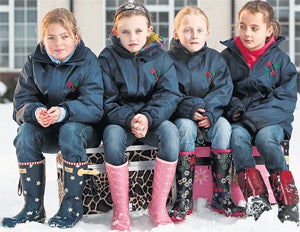Last Night's Television:<br/>Leaving Home At 8, Channel 4 <br/>Dancing On Wheels, BBC3
An unsentimental education

When I was eight – long before I'd heard of Eton or Tory Toffs or any of those things that spring to mind when the Great British Public Schooling System comes up for review – I longed to go to boarding school. It was all Enid Blyton's fault: at Malory Towers, no one ever got homesick. They were too busy having midnight snacks and sneaking out of dormitory windows. And playing lacrosse. Not that my parents were having any of it. Good thing, too, judging from last night's viewing.
In Leaving Home at 8, we followed four little girls – April, Lottie, and twins Caitlin and Simone – as they began their first term at Highfield, a plummy boarding school in Hampshire. For their part, the girls seemed pretty excited (too much Malory Towers). Their mothers, on the other hand, were dreading it. I'm not sure I've ever really thought of boarding from the parents' point of view. It's always the kids I imagine: abandoned, lonely, crying into their empty porridge bowls à la Oliver Twist (but posher). Last night, though, it was the mothers who seemed to be bearing the brunt; frequently on the insistence of their boarding-school-bred military husbands. "I always said no child of mine would board," reflected Lottie's mother. Lottie's dad held a different view. "He's won," she said giving us a fixed smile.
Of course, when it came to actually leaving home, the children weren't nearly as chipper as they had first seemed. April, despite proclaiming that she wouldn't miss mum and dad "because sometimes they can be very annoying", found it the hardest, sobbing late into the night, late into the term. Boarding school life had yet to have any tangible effect on her. Her older brother, however, had been at Highfield for two years already – and it was all too apparent. Gone are any trace of pedestrian vowels, replaced instead with the orfs and oofs of a Conservative front bench. "I like staying here for the weekends," he chuckled. "We pretend to be terrorists and run round the school."
The whole thing – watching these sweet little people as they are gradually institutionalised – was so peculiar, so old fashioned, that it made for quite fascinating viewing. Overwhelmingly, it was impossible to ignore the sense that depositing one's child, boarding-school style, with a group of strangers is just deeply, deeply unnatural. To their credit, the Highfield staff did an admirable job. Mrs Dunn, the school nurse, appeared to be on call virtually 24 hours a day, playing good cop to the headmistress Mrs Grey's stony-faced strict, if not bad, cop. Still, watching the parents cope with their absent children was not a million miles away from watching an addict being weaned off drugs. They sat, tense, anxious, apparently unable to think of anything else. They're told not to telephone in the first week; when they got their first visit – for one hour, on a Wednesday – they could hardly contain themselves. "It's so weird to feel nervous about seeing your own child," reflected one. By the end of the first term, the children were settled, though their mothers, one suspects, won't feel that way for quite some time.
In Dancing on Wheels, the BBC provided a welcome variation on the increasingly mindless string of dance programmes dominating our screens. Six wheelchair-users are paired with "celebrity" partners, and given the chance to compete for a spot representing Great Britain in the Wheelchair Dance Sport European Championships. Honestly, I'd no idea such a sport existed, though it seems that's not saying much. It is, apparently, practised in more than 40 countries by upwards of 5,000 competitors.
Admittedly, the programme's choice of celebrity was a little random (Heather Small from M People, anyone? Jake Dean off of Hollyoaks?), as are the judges (two dancers from Strictly Come Dancing and the former wheelchair-basketball player Ade Adepitan), though that's more than offset by Brian Fortuna. He was in charge of coaching the contestants and was completely brilliant. Gone was the sappy nice guy persona he maintains on Strictly, replaced instead by a kind of foul-mouthed New York stage school sass. When the peculiarly sideburned James (accompanied by TV presenter Caroline Flack) dared to criticise his choreography, he virtually hit the wall, leaping all over the place spitting profanities. He was perfect. Though I do wish he'd stop wearing that stupid baseball cap. Each week, one couple is eliminated. Last night, it was the lovely Carolyne and her partner, the former rugby league player Martin Offiah, which was a shame because they were one of my favourites. Now Carolyne's out of the running, I'm throwing my weight firmly behind Di to win. She's got a wicked sense of humour, and plenty of guts. Much to her delight, she's partnered by Mark Foster. "Aren't I a lucky girl?" she giggles. Actually, I'd say he's the lucky one.
a.jarvis@independent.co.uk
Join our commenting forum
Join thought-provoking conversations, follow other Independent readers and see their replies
Comments
Bookmark popover
Removed from bookmarks